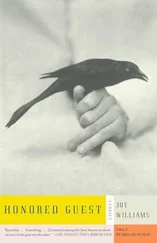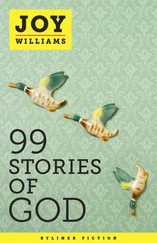“I thought it was a real pretty thing for Poppa to say, him being such a busy man and all,” Doreen says. “I think …”
“Don’t try to think now, sugar,” Cords says smoothly. “It causes a hardening ‘round the mouth. Besides it’s not the time. I’m just talking to our lost Kate here.” She raises one of her gloved hands and pats Doreen’s mouth with it. “I’ll hear your thinking later, sugar.” Doreen’s mouth is generous and a little slack. She smiles again at me, faintly and dismissively, in the way that Cords has taught her.
“I don’t know why you’re troubling yourself with me,” I say, looking over at the forestry building for Grady.
“I take an interest in you,” Cords says. “Seeing you is useful to me. It musters out my most helpful and endearing qualities. I have seen you riding about in a discontinued but very impressive car with a blond young man. I gather that you are looking for peace and safety in his company but he looks a bit frail to me. You have a clumsy way about you, Kate. I’d be careful that I didn’t press too hard. My single memory as a child was of my own clumsiness. It all seemed collected in my hands. They continually broke or worried things. They were very strong and big as well and should have belonged to one of my brothers. But they didn’t, they belonged to me. They were my protective mantling, I believe. A tool of survival, you might say. I was the last of thirteen children. My family insisted that I was the fourteenth. There was no thirteenth. They wouldn’t think of having had a thirteenth. I have heard that they’ve done that with the floors of hotels, the knowledge of which was not a consolation to me at the time.”
“You do go on,” I say.
“I apologize,” Cords says airily. “I meant only to make myself conducive to your distress. And, of course, I want to welcome you back.”
“I don’t live here any more,” I say. “I come back to classes only occasionally. We probably will never bump into each other again.”
Cords looks amused. “But that’s just not the way the world works,” she says cheerfully. “The same people are forever cropping up in our lives. Besides, we can be of assistance to each other. I’m sure we could have some nice talks that would make you feel better. As for myself, I can be easily obliged. I’ve heard that you know that black boy that does something or other in the menagerie on the bay. We need one of their animals, a cat of some sort, for Doreen’s Queen Serenade. It will be spectacular. I have it all planned. They have a leopard there, I’m told. I would like that. That would be best.”
“I wouldn’t be able to help you there,” I say worriedly. Trouble . Daddy had said, The snare and the pit will follow all the days of man. It always will . I see the darkness of Bryant’s Beasts. Dim. Brackish moist. The surface of the fish tanks breaks and glints and moves in silver circles across the animals. Their shadows are swollen on the walls. The leopard does not pace. He waits.
“We’ll see,” Cords says. “But it troubles me the way you drift off. You were looking back then again, weren’t you? A terrible weakness, memory. Memory’s just a hole that fills a lack.”
“I wasn’t remembering anything,” I say,
“I can see your problem, Kate. Really, I’m very sympathetic to it. You were born nicely, weren’t you, and were christened like Doreen here and you wore a little frock and you had white sturdy shoes. Your daddy told your mama to raise you so that you would love that which was good and hate that which was evil and you grew up hating and loving all the right things in all the right places and that’s dandy but it doesn’t seem to work out in the long run. Now it’s easier for me because my mama was nothing but a tumblebug. Rolled up a little ball of dung and laid her egg. And I hatched right there — surrounded by shit.”
“Icchhh!” Doreen is insistent this time. “You’re gonna make me sick, Cords. You’re gonna make it impossible for me to eat any lunch.”
“At the very least,” I say. “I’m going now,” I say. My simple statement sounds much too aggressive as though I didn’t know I didn’t mean it.
“I think you unsettled her even more than me,” Doreen whispers as I stride away.
“Don’t be stupid,” Cords says.
“I think I changed my mind about the beach,” I tell Grady. We are in an eddy of boys with slide rules slapping from their belts in holsters. Part of the wall in the first hall of this building supports a piece of redwood the size of our trailer. It is dirty and stained, with a tragic and breathless presence. THIS SLAB IS OLDER THAN CHRIST, a sign says. In part.
“Do you want to go anywhere?” Grady asks.
“No, nowhere.” Our legs seem trembling in a pool of pink from the redwood.
A POISONED HOST PREVENTED HER FROM DYING. I shake my head to try and clear it. Grady, leave me . I cling to him, forcing a smile. We walk back to the Jaguar.
Had Cords always appeared to be wearing a nylon stocking on most of her face? There is no assurance. Had Father ever bought me a sugar cone? And was it sherbet or a cream? Daddy never did. Had Daddy bought my napkins? Who else would I have asked? I was shy but he proceeded. Shameful tactics not of my invention. All grown up , he said. Before, Mother had always told us, Carry two safety pins and a dime for a telephone call at all times and in case .
The baby turns his big remora head and fastens on my heart. Grady has one hand on the wheel. He clutches his chest with his other. I cannot tear my eyes away. He gathers up the cloth of his shirt embarrassedly over the hole in his chest. I can see his quiet lungs …
“Look here,” he says, taking out a piece of paper from his pocket and handing it to me. “Would you like to go out Friday night for dinner?” There is a name on the paper and a number and an address. I can see the letters. “You remember them,” he says. “You’ve met them before.”
“Dinner? Of course,” I say ambitiously. “I’ll make a salad!” I am so grateful that Grady’s chest is not open, that he is speaking.
“They are a pleasant couple although he sometimes becomes tedious on the subject of ferns.”
“The Fern Fellow,” I exclaim, remembering. “Very agreeable.”
Right,! he would say to anything and then pursue his own dichotomous course. Right! We haggled all night. Small silky hairs grew from the palms of his hands.
We are on the road now, heading home. There is a truck ahead of us, moving slow. The road is narrow and winding. It is a small truck, hauling mirrors. They hang from all sides in glinting sheafs. “Oh, pass him!” I cry. Grady noses around his bumper, but pulls back in. Seconds later, a logging rig hurtles by from the other direction.
“I can’t for a minute,” he says. “We have to wait until the road straightens out.”
THAT WHICH HAS BEEN IS NOW AND THAT WHICH IS TO BE HATH ALREADY BEEN AND GOD REQUIRETH THAT WHICH IS PAST. The eye’s our totem but mine’s snapping and popping like a jacked deer’s eye. There is nothing in the glass but ourselves. We are pinned like butterflies to the worn seats. Even the trees have been banished.
“Then stop,” I beg. “Pull over and let him go on, past our road.” My voice is weak. All my strength is in my feet, pushed against the floor boards. The Jaguar struggles to a halt. The truck sways skittishly around a curve and is gone. Before us is the world again, sounds settling in the void of the engine’s silence. Grady’s parked in a burnt-out pocket of woods. And it’s then we can heard the sound of singing, very frail but determined, and see the sign of a penciled arrow on a butter box nailed to a tree.
Читать дальше












